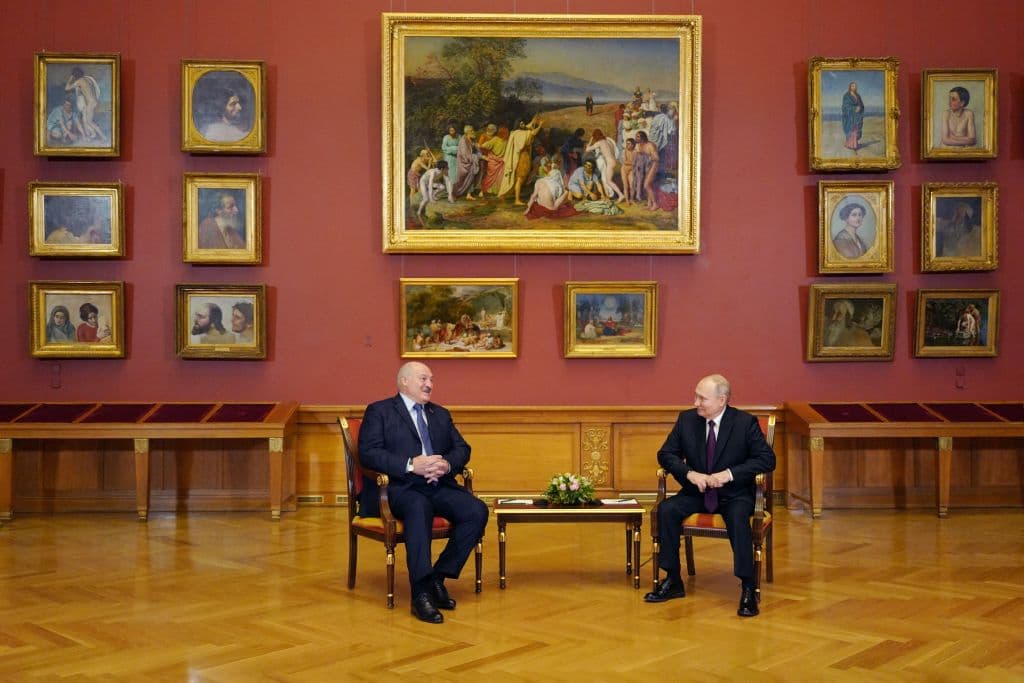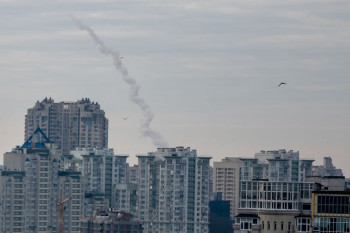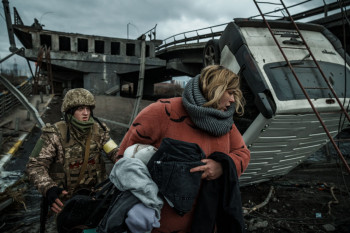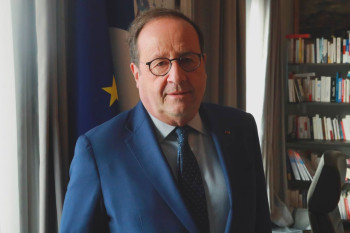Belarus Weekly: Minsk says 'Ukrainian S-300 missile' falls in Belarus

Belarus dictator Alexander Lukashenko met with Russian President Vladimir Putin for the second time in ten days.
On Dec. 27, Lukashenko flew to St. Petersburg to meet with Putin for the ninth time in 2022. Publicly little was said about the results of these talks.
One of the Russian MiG-31 supersonic interceptor aircraft stationed in Belarus caught fire on Christmas.
Belarus' Defense Ministry continues to conduct sudden military inspections, publicly denying that more drills will take place.
The Interior Ministry announces the creation of two special units to combat "illegal armed formations," referring to the regiments of Belarusian volunteers within the Ukrainian army.
Four Belarusians, who attempted to derail trains carrying Russian troops to fight in Ukraine, received over 20 years of imprisonment in one of the harshest politically motivated sentences.
Three-time Olympic medalist Aliaksandr Apeikin was the first person to receive a prison sentence in absentia – 12 years and the seizure of assets.
Human rights watchdog reports an inmate's death due to the lack of medical assistance in a prison where the prominent opposition leader Maria Kalesnikava is held after surgery in late November.
Minsk says 'Ukrainian S-300 missile' falls in Belarus
The Belarus Defense Ministry claimed that its forces shot down a Ukrainian air defense missile that entered its airspace during Russia's renewed mass strike across Ukraine on Dec. 29.
Minsk's state-run news agency BelTA claimed that Belarusian forces "destroyed" a "Ukrainian S-300 missile" as soon as it crossed the state border at around 10 a.m. local time.
The projectile fell in a field in Brest Oblast in southern Belarus, and there were no casualties, BeITA said.
Ukraine neither denied nor admitted to its involvement in the incident, adding that it could be Russia's "deliberate provocation."
Ukraine's Defense Ministry said Russia may have purposefully planned its missile trajectory so that Ukraine's air defense missile would enter Belarus' airspace as it tries to shoot down a Russian missile.
"The Ukrainian side is aware of the Kremlin's desperate and stubborn aspirations to drag Belarus into its aggressive war against Ukraine," the ministry said in a statement.
The ministry added that Ukraine has the "unconditional right" to defend itself against Russia's "massive missile attack."
Amid Minsk's calls for investigation, Kyiv said that it is ready to begin the procedure but only if it is organized by third countries not connected to Russia.
Shortly after the incident, the Belarusian Foreign Ministry summoned Ukraine's Ambassador to Belarus, the ministry spokesman said at a press briefing.
Minsk is Moscow's closest international ally in the region. Belarus has allowed Russian troops to use its territory as a launchpad to attack Ukraine since Feb. 24. The West has warned Minsk against helping to kill civilians in Ukraine.
Belarus announces more military inspections, military command tests inflicting 'martial law'
On Dec. 28, Minsk Military Commandant announced drills on inflicting martial law in case of war.
The Defense Ministry claimed the drills to be part of the planned wider military inspection.
Earlier, on Dec. 23, State Secretary of the Belarusian Security Council Alexander Volfovich announced more inspections of the Armed Forces.
The previous unannounced inspection took place on Dec. 13-19 at Lukashenko's request.
The Belarusian dictator cited "possible aggression from neighboring states" as the main reason.
As part of the inspection, the military was required to get promptly deployed near the border, organize its defense, and build bridges across the rivers Neman and Berezina.
As more inspections are expected, Belarusian General Staff announced 9,000 reserve personnel to be called up for military training over 2023, claiming the number to be the annual average for the Belarusian military.
The monitoring group Belarusian Hajun refers to the different numbers citing Belarusian Defense Minister Viktor Khrenin, who claimed earlier in October that, on average, 6,500 reservists are called up every year.
Putin, Lukashenko meet second time in 10 days, keep talks in secret
On Dec. 26-27, Lukashenko met Putin for the ninth time in 2022, this time in St. Petersburg.
Lukashenko took part in an informal summit of the leaders of the Commonwealth of Independent States, the international organization uniting several post-Soviet republics.
The event didn't provide many official statements.
It was declared that Russian and Belarusian autocrats have reached agreements on "many issues."
Among the few public announcements, 2023 was declared a year of the Russian language in CIS countries.
In Belarus, Russian is ubiquitous and subsequently pushes out the national language from public use. Speaking Belarusian might serve as an aggravation for political prisoners.
The deepening ties between the two regimes keep Ukraine alert for a potential border escalation from its northern neighbor.
Belarus became a staging ground for the Russian offensive toward Kyiv in February 2022 and served as a launchpad for repetitive airstrikes on civilian infrastructure.
The country currently stations the joint regional military command of the two countries. Belarus and Russia also regularly hold joint military drills.
Russian MiG-31 catches fire in Machulishchy airfield in Belarus
One of the three Russian MiG-31 supersonic interceptor aircraft stationed at Belarusian Machulischy airfield next to Minsk caught fire on Dec. 25, Belarusian Hajun monitoring group reports.
The fire rendered the jet inoperable.
MiG-31 supersonic interceptor aircraft arrived in Belarus on Dec. 13 and conducted six training flights by Dec. 28.
Accompanied by long-range radar detection and control aircraft Il-76, they're believed to be conducting reconnaissance and spotting targets on Ukrainian territory.
Echelons with Russian ammunition return to training ranges after being put on display near the border with Ukraine
Belarusian Hajun monitoring group reported that the equipment moved to the border with Ukraine on Dec. 20 was returned to the training ranges.
The Independent Union of Belarusian railroad workers confirmed that the trains stood at the stations for 15 to 23 hours and headed back without unloading.
Only one train out of three remains at Zhitkovichi near the Ukrainian border carrying 20 infantry fighting vehicles, three petrol trucks, seven Ural trucks, and a KamAZ-based mobile control center.
Belarusian Hajun says the movements are intended to either check the speed of equipment transfer or to attempt to intimidate Ukraine and create the appearance of escalation.
Kyrylo Budanov, the head of Ukraine's Intelligence Directorate, labeled the Russian "carousels" of trains in Belarus a part of the "disinformation campaign" designed to create tension at the northern border of Ukraine.
An offensive from Belarus can not be excluded, Budanov alleges, but as of today, Ukrainian intelligence has no evidence of an immediate threat.
The latest report by the British Defense Ministry suggests that the Russian forces recently deployed to Belarus might include elements of Russia's 1st Guards Tank Army.
The report specifies that the formation was likely conducting training before its deployment and is unlikely to have the support units needed to make it combat-ready.
Belarus creates special units to counter 'armed groups'
Belarus' Interior Ministry has created two special units, dubbed "Lynx" and "Tornado," to counter so-called armed formations and reconnaissance groups in Belarus.
Belarusian Interior Minister Ivan Kubrakou said the new units will work alongside the country's riot police "in the case of an attempt by 'extremist groups' to manipulate the current government by force."
Kubrakou said the decision was in part made due to the presence of Belarusian volunteers fighting alongside Ukraine's military and the fraudulent 2020 Belarusian presidential election.
The two special forces are reportedly associated with military formations based in Minsk, notorious for having dispersed the post-election protests in 2020.
Belarusian railroad saboteurs sentenced to up to 23 years in jail
The trials of four alleged Belarusian railroad saboteurs resulted in prison sentences ranging from 16 to 23 years. The four individuals are accused of having attempted to stall the advance of Russian troops in Belarusian territory at the beginning of Russia's full-scale invasion of Ukraine.
Human rights groups in Belarus recognize the individuals as political prisoners.
Aleh Malchanau, Dzmitryi Ravich, and Dzianis Dzikun were sentenced to 21, 22, and 23 years in prison, respectively, for alleged "terrorism," "high treason," and involvement in "extremist activities." Vital Melnik was sentenced to 16 years in prison.
On Feb. 28, the four individuals allegedly disabled a segment of the railroad in Belarus near Ukraine.
Since the start of Russia's full-scale invasion, Russia has relied extensively on Belarus' railway system to transport both troops and equipment to Ukraine.
As a result, Belarus' railway system has become a target for Belarusian railroad saboteurs that oppose the war.












